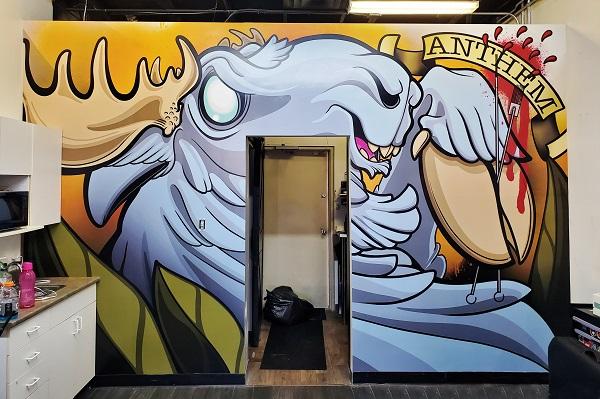The Impact of Wall Murals: Transforming Spaces and Enhancing Branding

In the realm of
interior design and branding, few elements are as impactful as wall murals.
These large-scale artworks can transform ordinary walls into extraordinary
experiences, allowing businesses and homeowners alike to express creativity,
convey messages, and enhance the overall aesthetic of a space. Whether used in
commercial settings to reinforce brand identity or in residential areas to
create a unique ambiance, wall murals have become a popular choice for those
looking to make a statement.
In this
article, we will explore the various aspects of wall
murals, including their benefits, design considerations, and how they can
significantly influence both residential and commercial environments.
1. What are Wall Murals?
Wall murals are large paintings or designs that are applied directly to walls, covering a significant portion of the surface. They can be hand-painted by artists or printed using high-quality materials and advanced printing techniques. The versatility of wall murals allows for a wide range of styles, from realistic images and abstract designs to typography and graphic illustrations.
Types of Wall Murals
- Hand-Painted Murals: These murals are created directly
on the wall by skilled artists. Hand-painted murals can be customized to
fit the specific vision and dimensions of a space, offering a unique,
one-of-a-kind piece of art.
- Printed Vinyl Murals: This method involves printing a
design on vinyl material, which is then adhered to the wall. Printed vinyl
murals are often easier to install and remove, making them a popular
choice for businesses that may want to change their designs periodically.
- Trompe-l'œil Murals: This artistic technique creates an optical illusion, making it appear as though the wall extends into a different dimension. Trompe-l'œil murals can be used to create the illusion of windows, doors, or other architectural features.
2. Benefits of Wall Murals
Enhancing
Aesthetic Appeal
One of the most
significant benefits of wall murals is their ability to enhance the visual
appeal of a space. A well-designed mural can serve as a focal point, drawing
attention and creating a memorable atmosphere. Whether it’s a vibrant, colorful
design or a more subdued, monochromatic palette, murals can complement and
elevate the overall decor.
Boosting
Brand Identity
For businesses,
wall murals are a powerful branding tool. They provide an opportunity to
communicate a brand’s values, mission, and personality through visual
storytelling. Incorporating logos, taglines, or thematic imagery into a mural
can reinforce brand identity and create a cohesive environment that resonates
with customers.
Inspiring
Creativity and Positivity
Studies have
shown that art in the workplace can improve employee morale and productivity.
Wall murals can inspire creativity, foster collaboration, and create a more
engaging work environment. In residential settings, murals can evoke emotions,
stimulate conversations, and create a sense of wonder and joy.
Space
Optimization
Murals can be
strategically used to optimize space, especially in areas where traditional
decor may not be feasible. For example, a mural depicting a serene landscape
can make a small room feel more expansive, while a bold geometric design can
add visual interest to an otherwise bland hallway.
3. Design Considerations for Wall Murals
Theme and
Purpose
Before
embarking on a mural project, it’s essential to define the theme and purpose.
Consider the message you want to convey and how the mural will fit into the
overall aesthetic of the space. Whether it’s a calming nature scene for a spa
or a vibrant cityscape for a restaurant, the theme should align with the
environment and its purpose.
Color
Palette
Choosing the
right color palette is crucial for the success of a wall mural. Colors can
evoke emotions and influence perceptions, so it’s essential to select hues that
resonate with the desired atmosphere. For example, warm colors like reds and
oranges can create energy and excitement, while cool colors like blues and
greens can promote tranquility and calmness.
Scale and
Placement
The scale of
the mural should be carefully considered in relation to the wall size and
surrounding furniture. A large mural can overwhelm a small space, while a small
design may get lost on a vast wall. Additionally, placement is key; consider
the sightlines and how the mural interacts with light and shadows throughout
the day.
Material and
Durability
When choosing materials for wall murals, consider durability and maintenance. High-quality paints and finishes can ensure longevity, especially in high-traffic areas. For commercial spaces, using washable materials can help maintain the mural’s appearance over time.
4. Wall
Murals in Commercial Spaces
Retail
Stores
In retail
environments, wall murals can enhance the shopping experience and encourage
customer engagement. They can be used to showcase products, tell a brand story,
or create an immersive theme that aligns with seasonal promotions. For example,
a clothing store might feature a mural depicting a trendy urban landscape,
reinforcing its modern brand identity.
Restaurants
and Cafes
In restaurants
and cafes, murals can create a unique dining atmosphere. From whimsical
illustrations to stunning landscapes, murals can evoke specific moods that
complement the menu and dining experience. A coffee shop, for instance, might
feature a mural inspired by coffee-growing regions, enhancing the overall theme
and ambiance.
Offices
In corporate
offices, wall murals can enhance the workplace environment. They can reflect
company culture, showcase achievements, or inspire innovation. Murals that
incorporate motivational quotes or images that promote teamwork can foster a
positive and productive work environment.
5. Wall Murals in Residential Spaces
Living Rooms
In residential
settings, wall murals can serve as stunning focal points in living rooms. A
large mural depicting a serene beach scene or a vibrant city skyline can set
the tone for the entire space. Homeowners can express their personalities and
create a unique atmosphere that reflects their tastes.
Bedrooms
In bedrooms,
wall murals can create a calming retreat. Soft colors and tranquil imagery,
such as nature scenes or abstract designs, can promote relaxation and
restfulness. Customized murals that reflect personal interests or hobbies can
also add a personalized touch to the space.
Children’s
Rooms
For children’s
rooms, wall murals can spark imagination and creativity. Themes such as outer
space, enchanted forests, or favorite cartoon characters can create a magical
environment for kids. Murals can also be easily updated as children grow and
their interests change.
Conclusion
Wall murals are
a dynamic and creative way to transform spaces and enhance branding. Their
ability to convey messages, evoke emotions, and create unique environments
makes them a popular choice for both commercial and residential applications.
By carefully considering design elements such as theme, color, scale, and
material, businesses and homeowners can leverage wall murals to make lasting
impressions and elevate their spaces. Whether you’re looking to inspire
creativity in the workplace or create a warm, inviting atmosphere at home, wall
murals offer endless possibilities for expression and transformation

Comments (1)
Craig M.
2
3Sixty Sign Solutions
Such a nice article to read